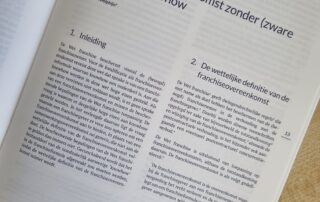Sales over the Internet
It is impossible to imagine our society without the internet. The sale of products and services via the internet is also constantly increasing. It is therefore advisable to include provisions in franchise agreements that relate to e-commerce, for example. In this context, however, competition law regulations must be taken into account.
The general rule of competition law is that the franchisor is not permitted in franchise agreements to restrict sales by the franchisee, insofar as these restrictions relate to the territory in which or the customers to whom the franchisee may sell products or services.
However, there are four exceptions to this main rule. One of these exceptions is that the franchisor is permitted to limit active sales by franchisees to a specific exclusive territory. This implies that the franchisor may not impose any restrictions on the franchisee’s passive sales. And here lies the link with e-commerce. An example of active sales via the Internet is the sending of e-mail messages by the franchisee to (potential) customers on its own initiative. Passive selling is understood to mean the franchisee’s response to spontaneous requests from individual customers, including the provision by the franchisee of products and services to those customers. In general it can be said that the mere use of the internet cannot be regarded as a form of active selling. The consequence of this is that the franchisee must in principle be able to use the internet unimpeded to promote and/or sell products and/or services.
Is it then completely impossible for the franchisor to influence the passive e-commerce activities to be performed by the franchisee? The answer to this is negative. The franchisor is allowed to impose quality standards on the franchisee with regard to the use of a website. This could include (reasonable) requirements that the franchisor can set for the content and design (for example the use of certain colours) of the website to be used by the franchisee. So that both the franchisor and the franchisee know where they stand, it is important that the franchise contract (or the franchise handbook) sets out the rights and obligations of both the franchisor and the franchisee in the field of e-commerce, including the quality standards mentioned. , be clearly formulated.
Ludwig & Van Dam franchise attorneys, franchise legal advice

Other messages
Continued activities of the franchisee do not violate a non-competition clause
A judgment was recently rendered in preliminary relief proceedings in ...
Car dealer wrongly not a franchisee?
The Franchise Act entered into force on 1 January ...
Suspension of payouts allowed by the franchisor
The District Court of Limburg ruled on 30 March 2023, ...
Franchising is on the rise: ‘There is still a huge amount of room for it in the Netherlands’
An interview with mr. AW Dolphijn about franchise. De Beren, ...
The franchise agreement without (heavy demands on) know-how
In the 2023-1 edition of Contracting magazine, I published a ...
Standstill period violation
On 15 March 2023, the District Court of Noord-Holland, ECLI:NL:RBNHO:2023:2636, ...







